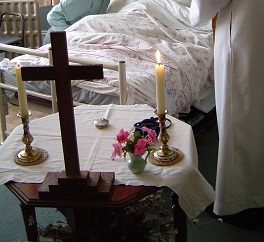Catholic Medical Quarterly Volume 61(3) August 2011, 36-7
Do I have a DUTY to arrange for my patients to receive Communion and Sacraments for the dying?
We are often asked about the right care of the dying and there has been plenty of concern recently about poor care of the elderly. The Ombudsman's recent report "Care and compassion" (1) clearly sets out the worries.
 Given the deep concerns about poor care of the elderly, it's worth
setting out what would be a right response to spiritual care of the
dying. The
National Audit Office (2) found that clinical care tools such as the
Liverpool Care Pathway did not lead to good compliance with standards on
spiritual care prompts. Indeed it was found that only 13% of people
dying in Sheffield received care from a pastor, priest or religious
leader in the last months of life. This is of concern, as far more
people than that are religious.
Given the deep concerns about poor care of the elderly, it's worth
setting out what would be a right response to spiritual care of the
dying. The
National Audit Office (2) found that clinical care tools such as the
Liverpool Care Pathway did not lead to good compliance with standards on
spiritual care prompts. Indeed it was found that only 13% of people
dying in Sheffield received care from a pastor, priest or religious
leader in the last months of life. This is of concern, as far more
people than that are religious.
The Mental Capacity Act sets out a requirement for healthcare staff to work in the best interests of their patients. Best interests clearly requires clinicians to provide excellent clinical care. But the legal definition of ‘best interests’ requires clinicians to think of and act upon the past wishes and beliefs of patients. Best interests states (3) that clinicians should:
Try to find out the views of the person who lacks capacity, including:
- The person’s past and present wishes and feelings – these may have been expressed verbally, in writing or through behaviour or habits.
- Any beliefs and values (e.g. religious, cultural, moral or political) that would be likely to influence the decision in question.
- Any other factors the person themselves would be likely to consider if they were making the decision or acting for themselves.
So, according to the Mental Capacity Act, a religious person has the right to expect that health care staff will act for them and obtain appropriate spiritual care when they lack capacity and cannot do this for themselves.
A nurse said to one of us recently how delighted she was that a lady had been able to see the priest. “If I had sent for the priest I might be disciplined and struck off” she said. the NHS has become a place where nurses (and doctors) fear to mention God. Clearly, the sick have a right to be helped to access the spiritual support they want.
More recently. we were asked if a person dying with a NG tube in situ might receive Communion. Of course in such a circumstance, a drop of the Precious Blood would be enough and even though the person is NG fed this might be administered onto the tongue. Clerical advice is that to do this one would need to be reasonably confident that the patient knows this is Holy Communion and understands that it is special, so some degree of awareness is needed. If the patient is comatose, the sacrament of the sick would be more appropriate. For a broader discussion of spiritual care and the Sacraments in dementia see this link. (4)
While such niceties might confuse some ordinary docs and nurses, perhaps what this sets out most clearly is how important good spiritual care is. For people who have lived their life in a religious and spiritual framework, illness is a very spiritual thing. Dying, even more so, is something that we wish to face in a state of grace. So it really is important that patients can expect to be fully supported in seeking religious and spiritual care by the staff who care for them.
Remarkably perhaps, ‘best interests’ under the Mental Capacity Act may well impose a DUTY upon health care staff to solicit excellent spiritual care for all those under their care who lack capacity and who would have wanted this during their current illness.
So, next time you have a person who is ill or dying, think about what their needs for spiritual care are. We must impose neither religion, nor the absence of it.
References
- Care and compassion . http://www.ombudsman.org.uk/care-and-compassion
- National Audit Office http://www.nao.org.uk/publications/0708/end_of_life_care.aspx
- Mental Capacity Act Code of Practice - Page 65
- http://www.dioceseofleeds.org.uk/flm/docs/spiritual care of dementia 9.ppt
